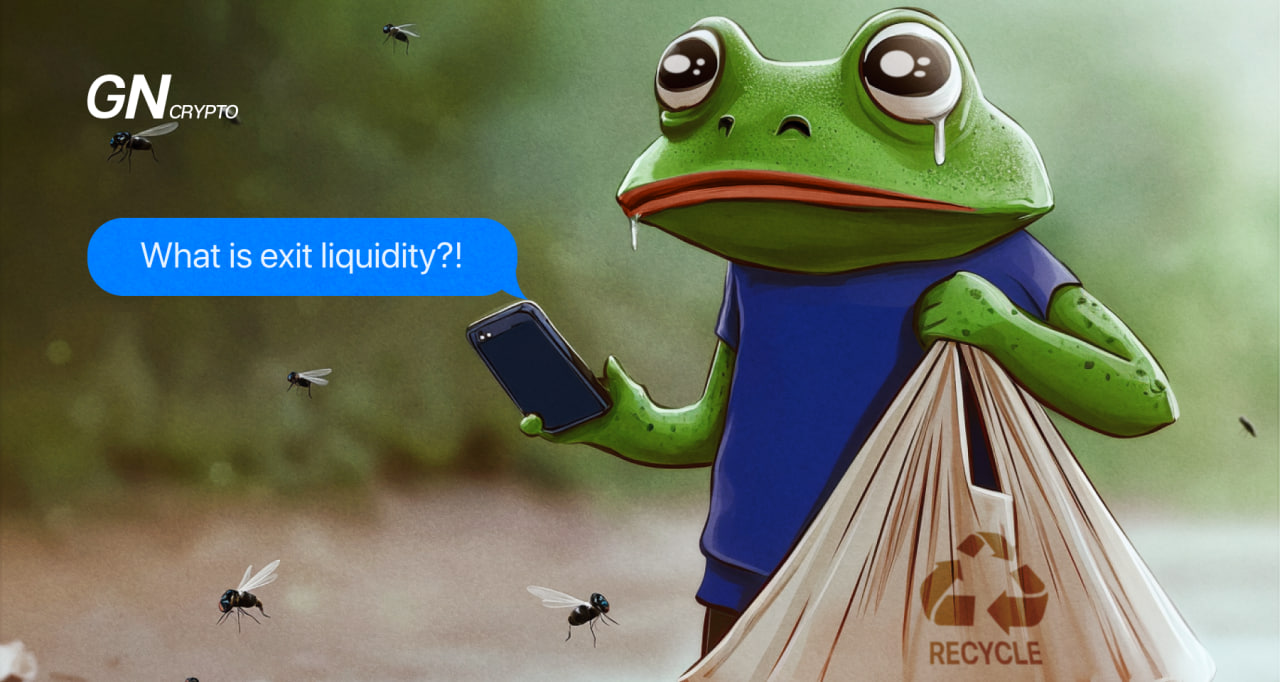Popular Crypto Slang Terms. Part 12

Want to fluently speak the language of seasoned crypto traders? We’ve prepared another roundup of the most popular expressions you might come across in discussions about cryptocurrency, trading, and blockchain.
On this page
Our previous entries have built a substantial glossary, so now even the most complex crypto slang will be easy for you to grasp. Catch up with the series:
And the journey continues.
Exit liquidity
The term “exit liquidity” refers to a situation where an imprudent investor buys cryptocurrencies or NFTs at peak prices, providing funds to earlier investors who need sufficient liquidity to lock in their profits. After such transactions, the price usually drops due to the lack of further interest in the asset. Thus, those fortunate early investors can exit the market with the liquidity provided by those who came in late.
It's important to note that liquidity in financial markets is a double-edged sword. While it enables ongoing trading, it can also be manipulated. Large asset holders, or “whales,” can generate artificial demand and hype through strategies like Pump&Dump). However, to cash out profitably, substantial initial liquidity is required.
This scenario resembles a game of “hot potato,” where the last player ends up holding the “hot potato” with no one left to pass it to. Investors who end up as the “hot potato” lack the liquidity to close the deal at a price better than what they paid.
No one wants to end up as ехіт liquidity. Source: Х
To avoid becoming a victim of scams and not turn into exit liquidity, traders should be cautious with ICOs, pyramid schemes, and manipulative tactics. Conducting thorough research (DYOR), refraining from emotional decisions, and avoiding FOMO can all reduce the risk of ending up with undesirable coins in one’s wallet. Yet, as shown by the case with the BALD token, even experienced players can sometimes fall into this trap.
Dark pools
Dark pools are essentially private, non-public trading venues or companies that enable institutional investors to conduct large-volume trades of cryptocurrencies without disclosing transaction details to the public. The assets traded on these platforms are termed “dark liquidity.”
Dark pools emerged as a solution for carrying out transactions anonymously. For instance, if a market whale wants to offload a significant amount of assets on a public exchange, they face the risk of driving the price down due to increased supply. Dark pools alleviate this risk by only revealing the transaction after it has been completed and by limiting information access to the direct participants involved. Sell orders are automatically paired with appropriate buy orders, and the transaction is executed with details such as price and quantity kept confidential.
In theory, this approach minimizes the influence of large stakeholders on the open market. However…
Dark pools operate anonymously. Source: Medium
The private and opaque nature of dark pools can raise concerns about potential market manipulation and unfair trading practices. This sets them apart from OTC markets, which are regulated venues designed for institutional trading that feature TradFi infrastructure, including bank support, multi-factor authentication, and insurance coverage for transactions.
Gas war
In the blockchain realm, “gas” refers to the unit that measures the computational resources required to execute specific operations on the Ethereum network. The complexity of an operation dictates the amount of gas it consumes. This term metaphorically represents the fuel that powers blockchain functionality.
During high-demand periods, such as an NFT drop, users might offer a higher gas price to ensure their transactions are prioritized. This action triggers others to do the same, setting off what's known as a gas war.
Essentially, this becomes a competitive auction where users vie for priority inclusion of their transactions in the next block. Gas wars usually erupt when there's a high demand for transaction processing and limited space in the upcoming block.
Gas wars can be perilous. Source: Makeuseof
This competition to push transactions through can lead to several adverse effects for all market participants. Firstly, many users find themselves unable to participate in regular trading because those who cannot or choose not to pay the elevated gas prices are pushed out of the queue. Secondly, the cost of gas increases across the entire network. Thirdly, the participants in the gas war often incur losses: after increasing their bids, they may discover that their offered price was still not competitive enough, resulting in their transaction not being included in the current block.
The content on The Coinomist is for informational purposes only and should not be interpreted as financial advice. While we strive to provide accurate and up-to-date information, we do not guarantee the accuracy, completeness, or reliability of any content. Neither we accept liability for any errors or omissions in the information provided or for any financial losses incurred as a result of relying on this information. Actions based on this content are at your own risk. Always do your own research and consult a professional. See our Terms, Privacy Policy, and Disclaimers for more details.




























